Eclipse Remote Gdb Error During File Upload Operation Failed. File System Input or Output Error
Eclipse¶
Eclipse is an Integrated Development Surroundings that can be used for C and C++ development and debugging. It is bachelor from the Eclipse Foundation website.
The default debugger used by Eclipse is GDB, only this tin exist replaced with UDB to let time travel debugging.
This section of the user guide describes the steps that are required in order to use UDB in Eclipse in the post-obit contexts:
-
Debugging a local target
-
Debugging a remote target
-
Replaying LiveRecorder recordings
Compatible versions¶
UDB is known to piece of work well with a compatible with a number of Eclipse versions, including Mars (4.5.1), Luna (4.four.2) and iii.8.1, and is likely to work with other versions besides. The following instructions are written for Eclipse Mars (4.5.ane), and some minor adjustment may be required for different Eclipse versions.
First steps¶
In all debugging scenarios, the following steps are required in order to enable opposite debugging buttons in the Eclipse GUI:
-
Choose Window -> Perspective -> Customize Perspective…
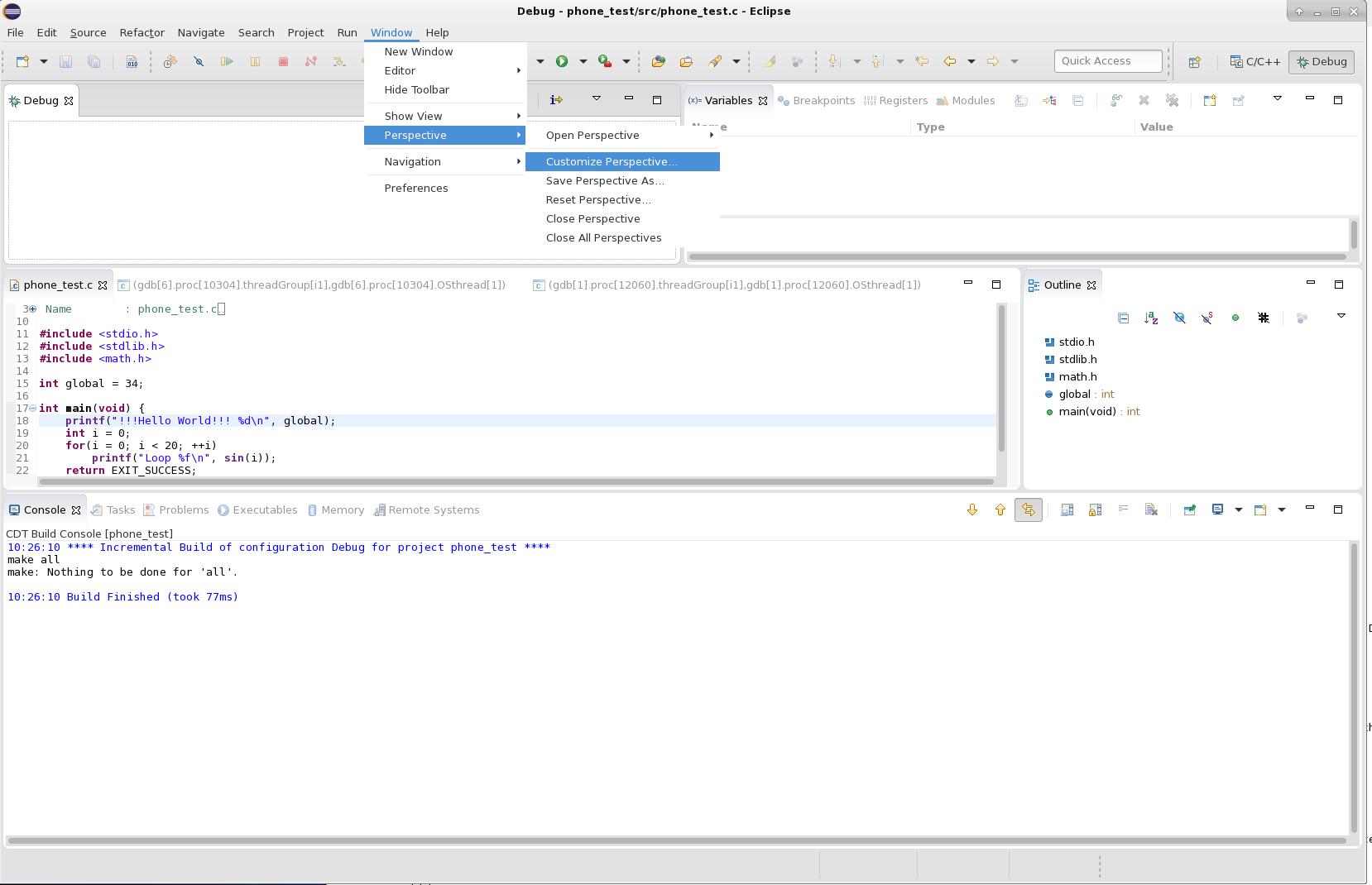
-
Choose the Activeness Set Availability sub-tab and check the Reverse Debugging choice on the left hand side (notation that it may be grayed out, merely information technology tin can still be checked). And then click OK.
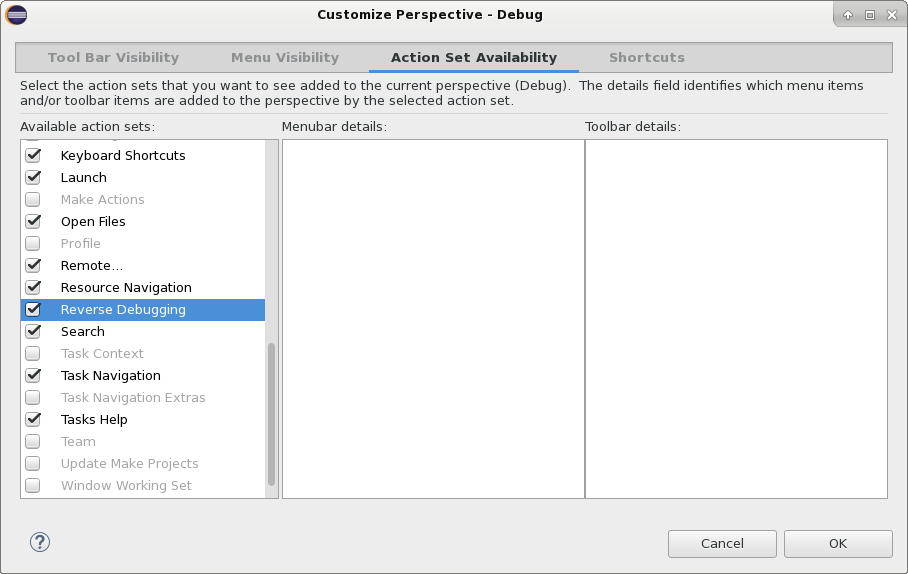
Debugging a local target¶
-
Enable the Eclipse contrary debugging buttons as explained in First steps
-
Open Debug configurations…
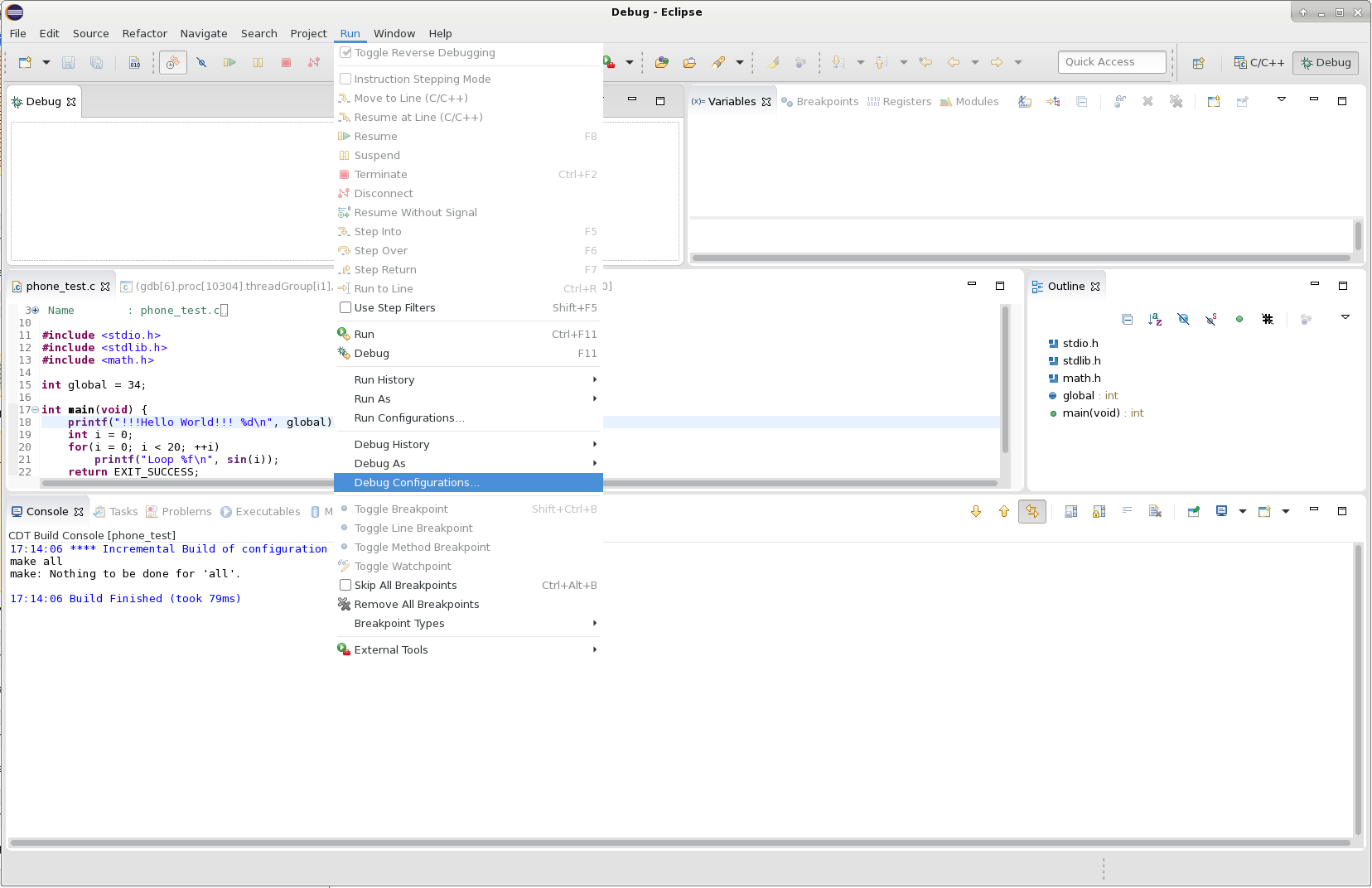
-
Choose C/C++ Application from the left hand side.
-
Choose the Debugger tab and enter the path to udb in the GDB Debugger box. Cheque the Enable Reverse Debugging at startup check box.
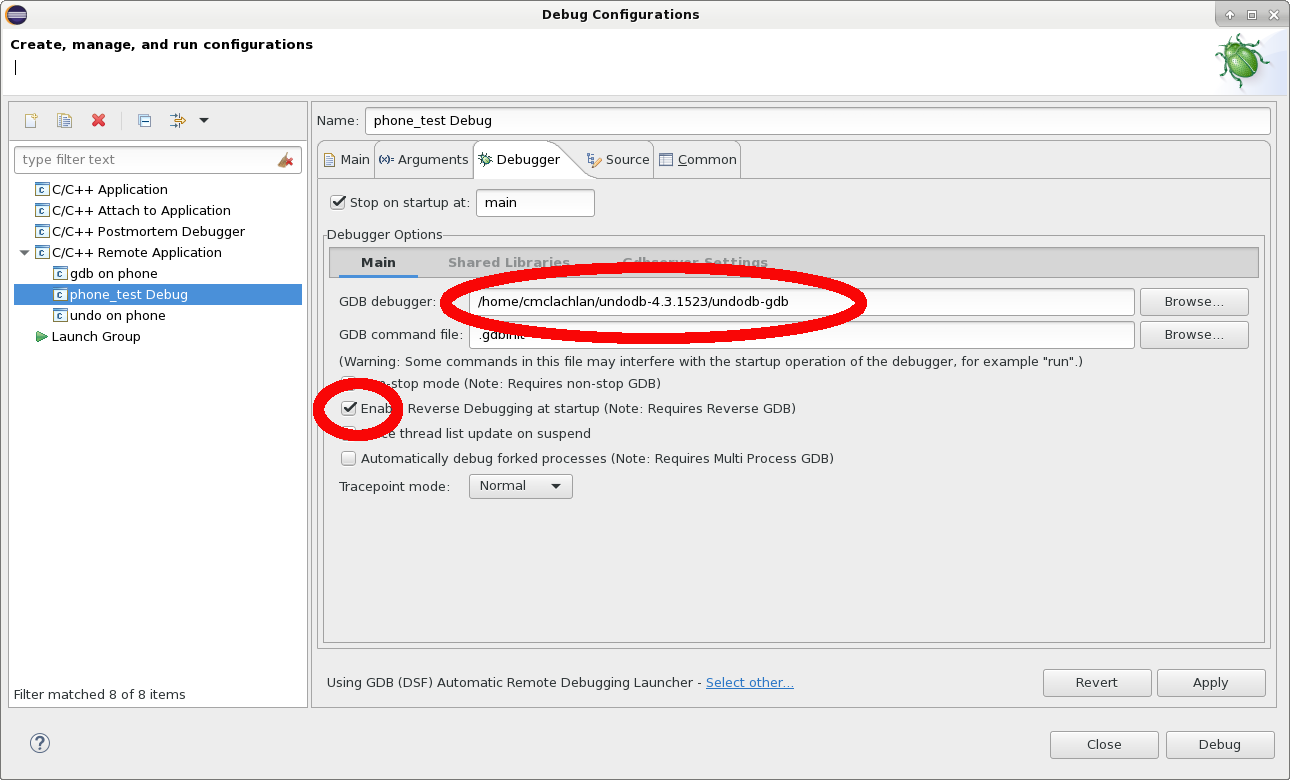
-
Click Debug to start the debug session.
-
Eclipse will finish at the beginning of
main(). The target tin be debugged normally, including with contrary-execution operations that are available as buttons on the toolbar.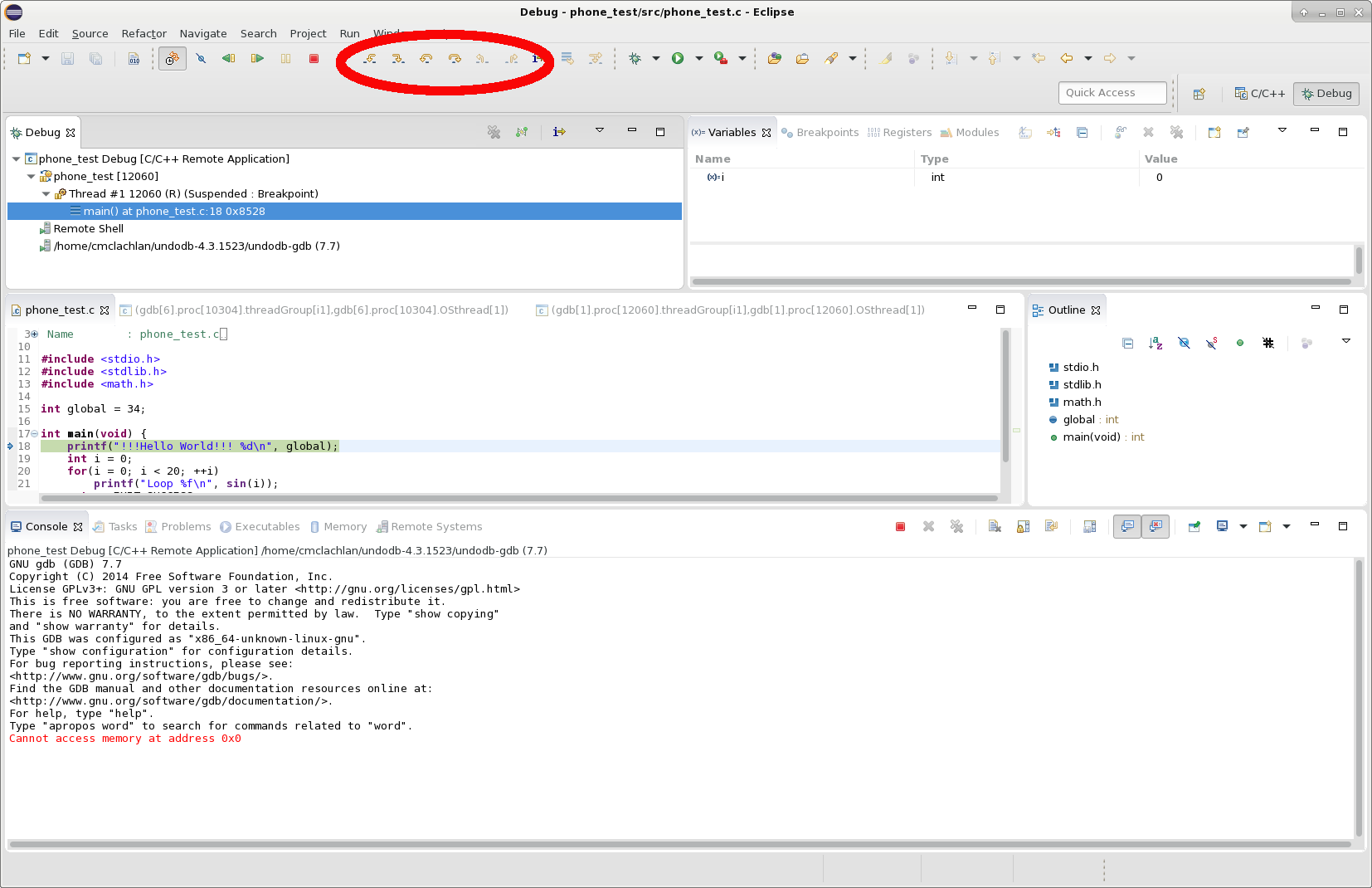
Debugging a remote target¶
-
Enable the Eclipse contrary debugging buttons as explained in Showtime steps
-
Copy the remote debugging server onto the remote target as explained in the Installing udbserver on the target department.
-
Open Debug configurations…

-
Cull C/C++ Remote Application from the left hand side and click the New button.

-
Click the New button next to Connection.
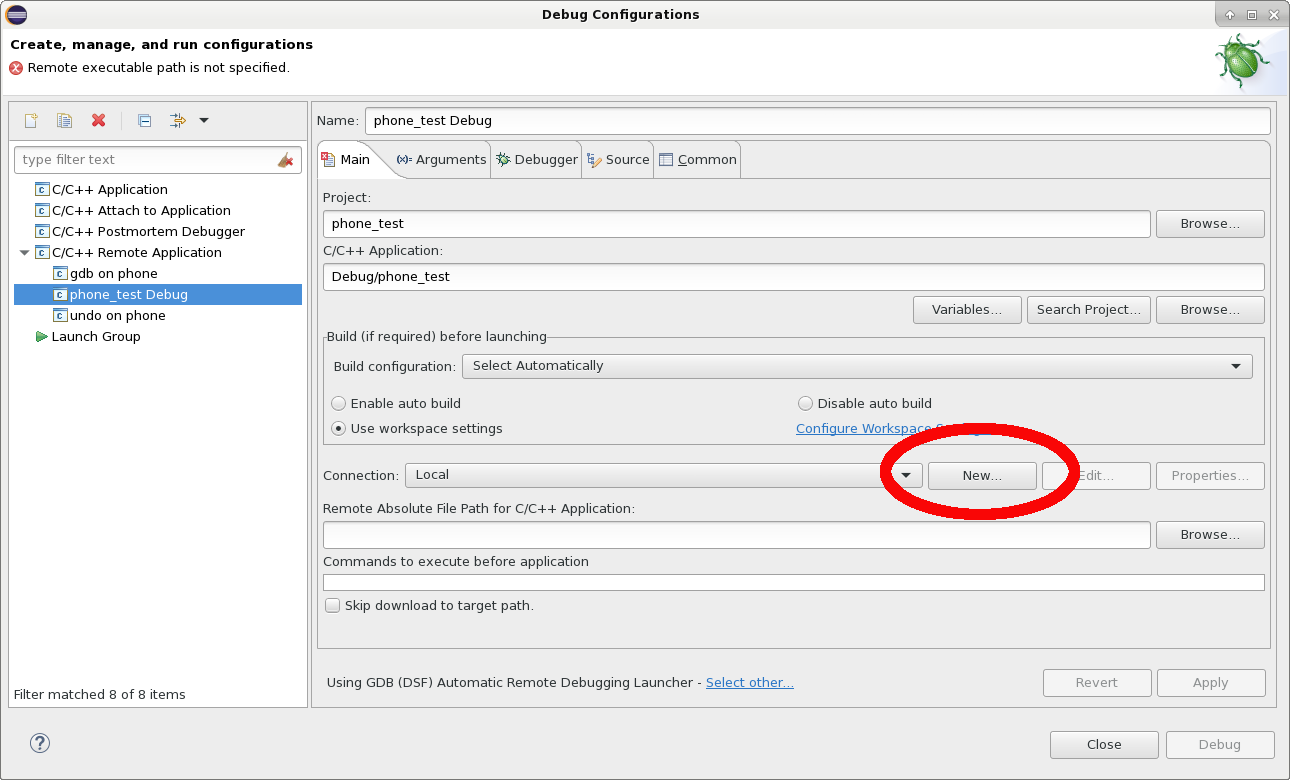
-
Choose SSH Only and click Next.
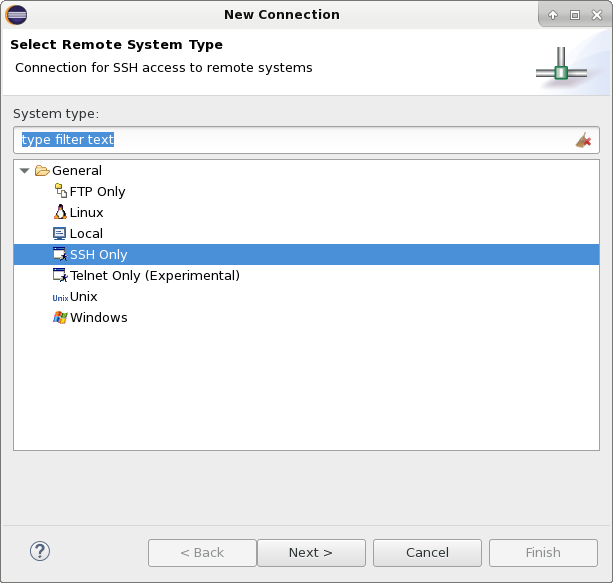
-
Put the IP address of the remote organisation into the Host Proper name: box and requite the connexion a name.
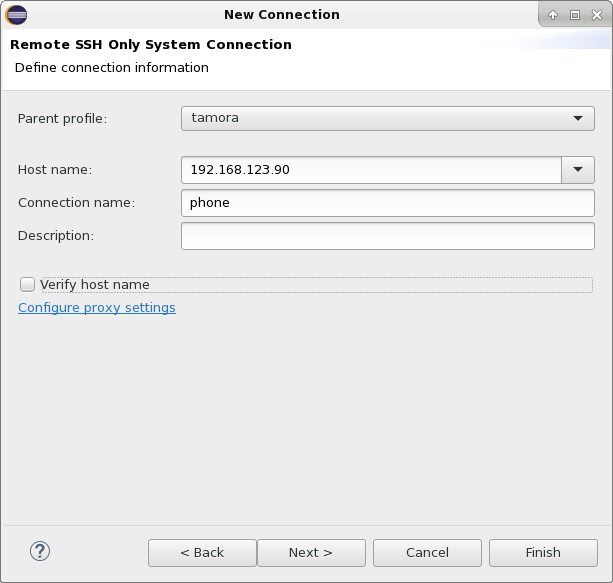
-
Continue pressing Next, and then Finish.
-
Make certain the new connection is selected in the Connectedness: drop downwardly.
-
Specify a valid destination path for the binary on the remote machine in the Remote Absolute File Path for C/C++ Application: box.
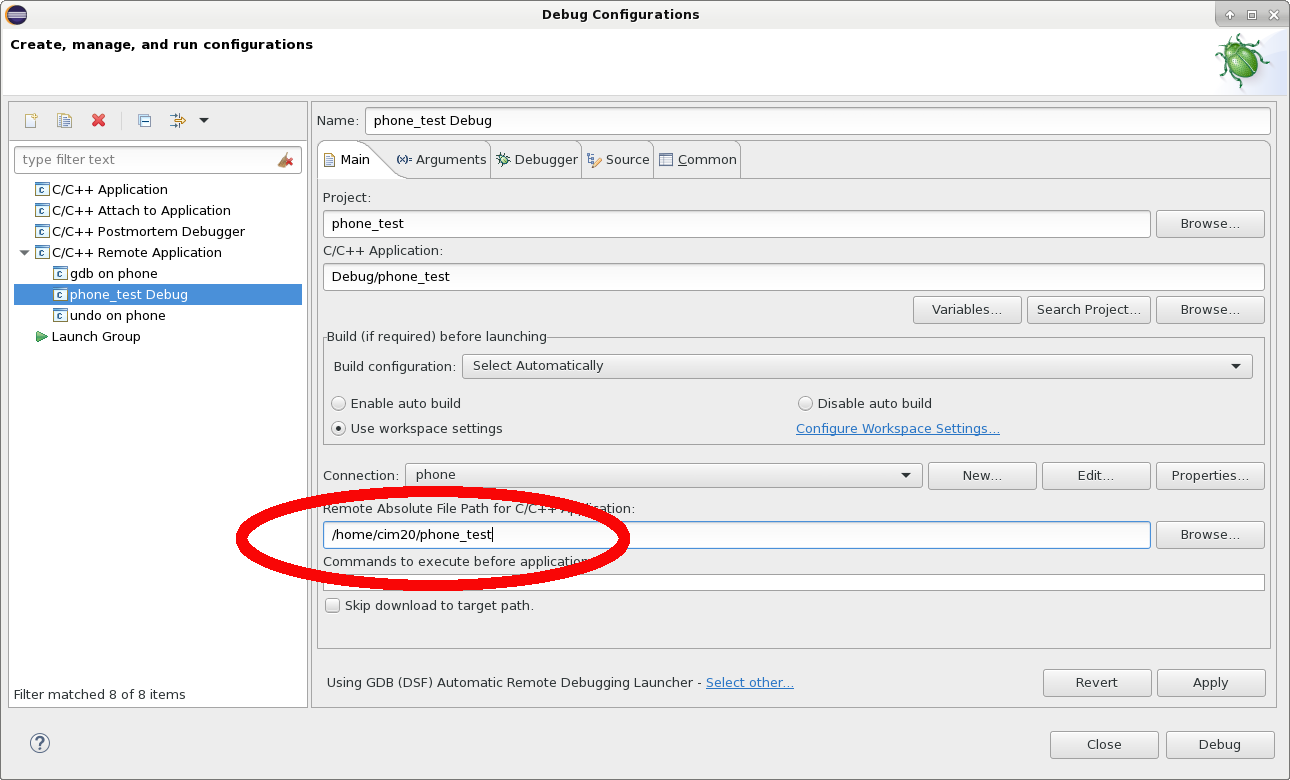
-
Cull the Debugger tab and fill in the path to udb on the host auto (that is, the machine running Eclipse) in the GDB Debugger box. Cheque the Enable Opposite Debugging at startup check box.

-
Choose the Gdbserver Settings sub-tab and put the remote machine'due south path to
udbserver_<arch>in the Gdbserver path box.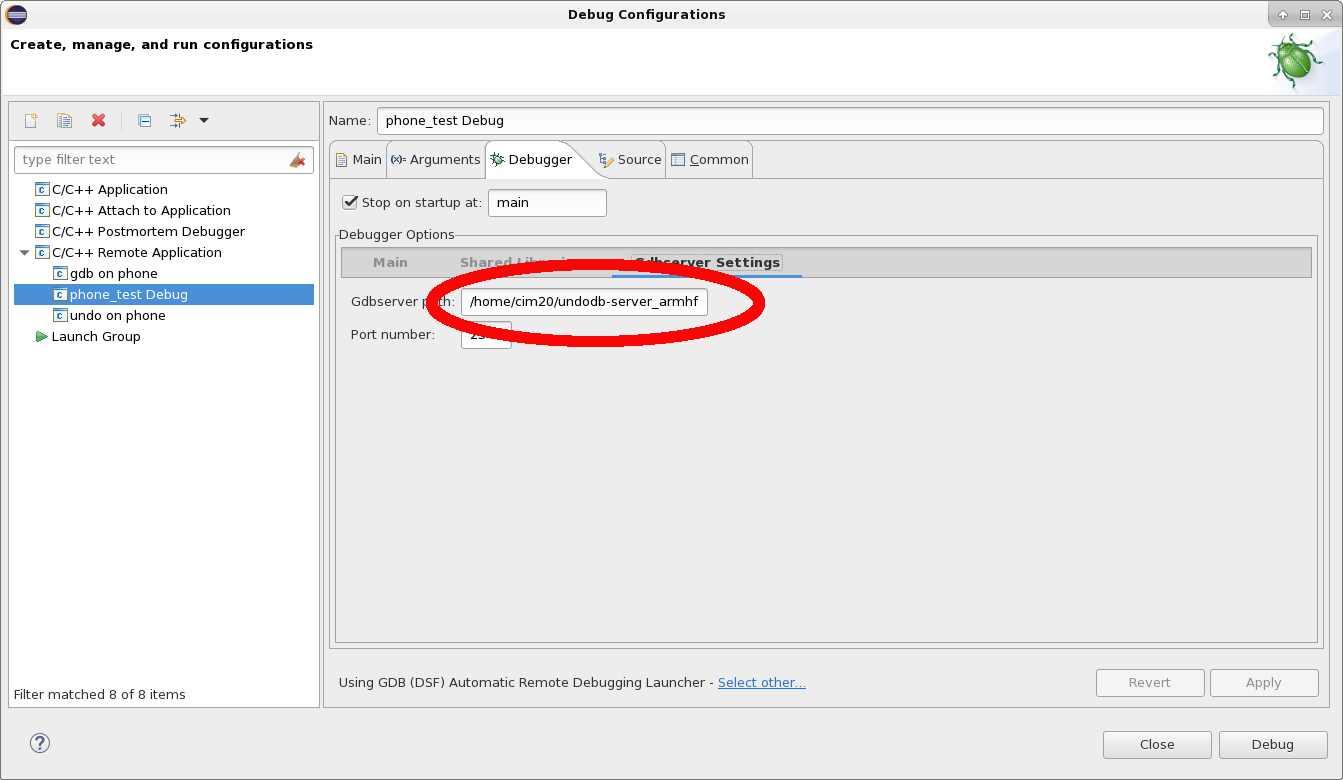
-
Click Debug then (if required) fill in the remote user and password in the SSH box that appears.
-
The binary will be copied to the remote car and started with udbserver. Eclipse will stop at the beginning of
main(). The target can at present be debugged normally, including with reverse-execution operations that are bachelor as buttons on the toolbar.
Replaying LiveRecorder recordings¶
LiveRecorder recordings can be replayed in Eclipse with the use of a remote udbserver instance.
If the recording was created on a foreign CPU architecture, for instance, ARM64, then it must be replayed through a remote session on a device matching that compages.
If the recording was created on a motorcar with the same CPU architecutre as that of the machine running Eclipse, the recording can exist replayed on the local host but a remote debugging configuration is nevertheless required in Eclipse.
Note
Make sure the binary existence recorded is the one compiled by Eclipse. On replay, Eclipse volition outcome a gdb file command with that binary, and if information technology doesn't match the binary used to brand the recording, no source lawmaking or part names will be displayed.
To configure Eclipse to replay recordings, follow the steps in Debugging a remote target, with the following additional steps:
-
Write a wrapper script on the remote machine that starts the right udbserver (see above) with the recording y'all've simply made, and uses the port number that Eclipse will pass through:
#!/bin/fustigate ./udbserver_<curvation> --eclipse-port $ane --load-file <recording>.undo
The architecture of the udbserver instance (represented by
<arch>) must friction match the architecture of the machine on which the recording was originally created.Note
Eclipse passes some additional arguments to the script containing the binary beingness replayed and any specified arguments, only these can safely be ignored considering the binary and the arguments used during recording are contained in the recording file.
-
Change the path in the Gdbserver path box and then that it points to the wrapper script on the remote automobile.
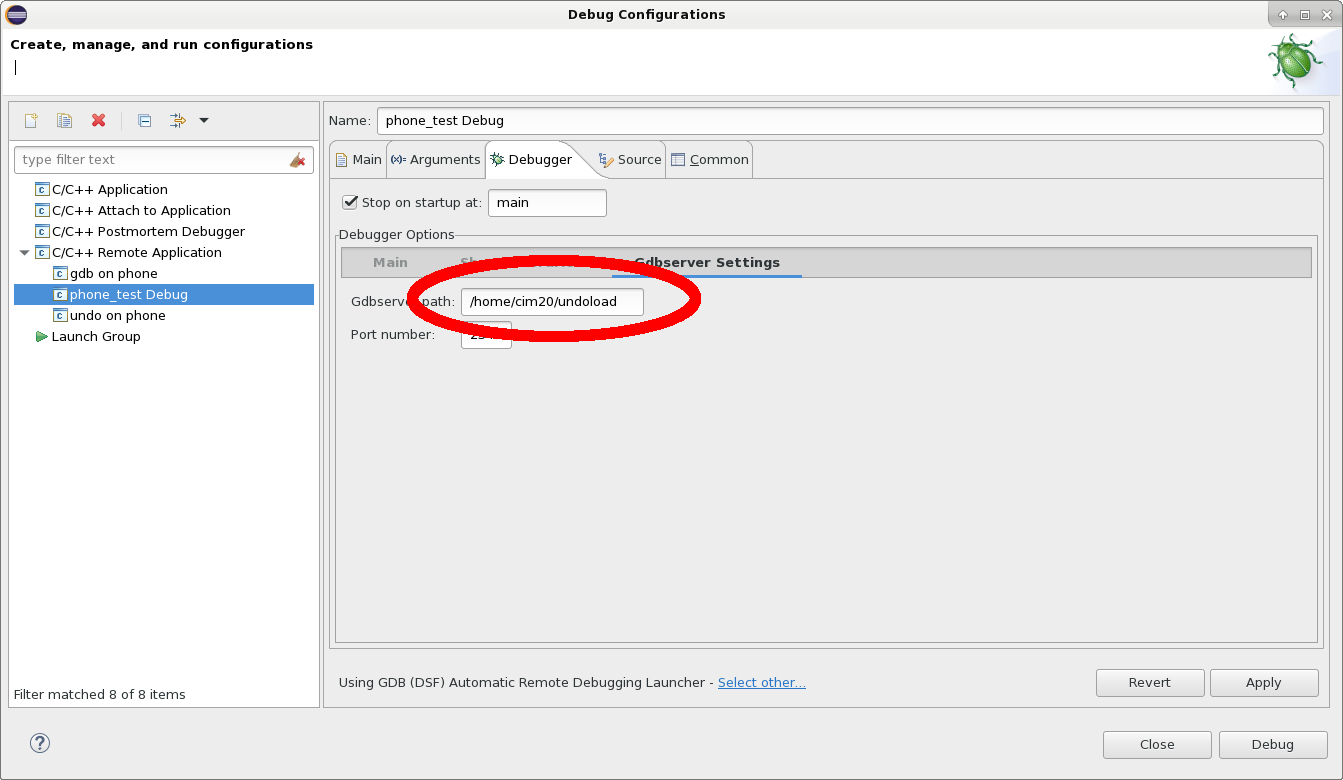
-
Offset the debug session.
Note that when replaying a foreign-compages recording (for example, ARM64), the following boosted steps are required:
-
Write a
gdbinitscript on the host motorcar that specifies the architecture of the remote machine. It should contain the post-obit text: -
Tell Eclipse to run that file by adjusting the debug configuration fix previously so that its name is in the GDB Command file: box
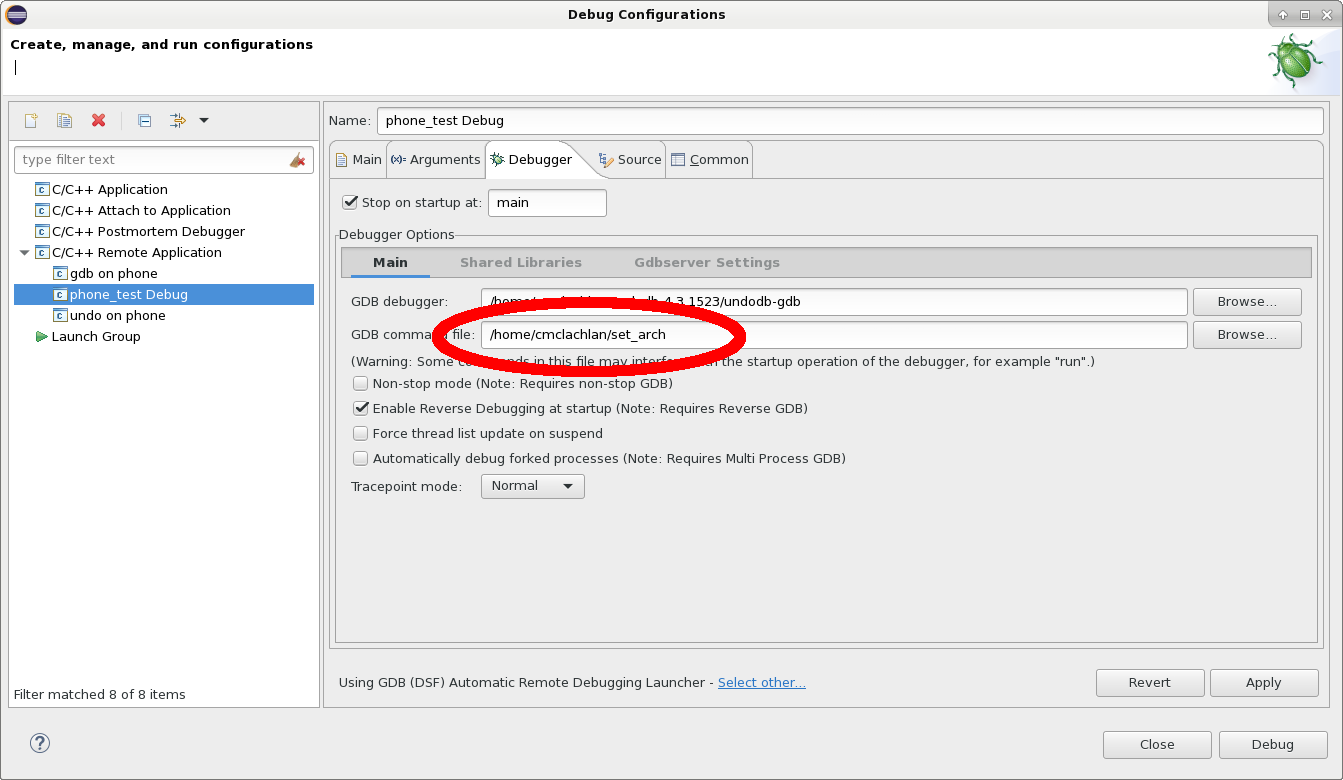
Troubleshooting¶
If yous encounter whatever issues when using UDB in Eclipse, the following information may be helpful.
If Eclipse displays the error Fault during file upload. Missing element for : '' it might hateful that either the source or the destination of the scp of the binary to the remote car is invalid. Check that the contents of the Remote Absolute File Path for C/C++ Awarding: contain a valid absolute path on the remote car. It may also exist required to fully specify an absolute path to the source binary (on the machine running Eclipse) in the C/C++ Application box of the same dialog.
The message Operation failed. File organisation input or output fault indicates that the SSH connection to the remote motorcar has either closed or has become dislocated in some way. This tin can be corrected by forcing a disconnect. Find the Remote Systems console. You may have to cull Window -> Prove View -> Other…
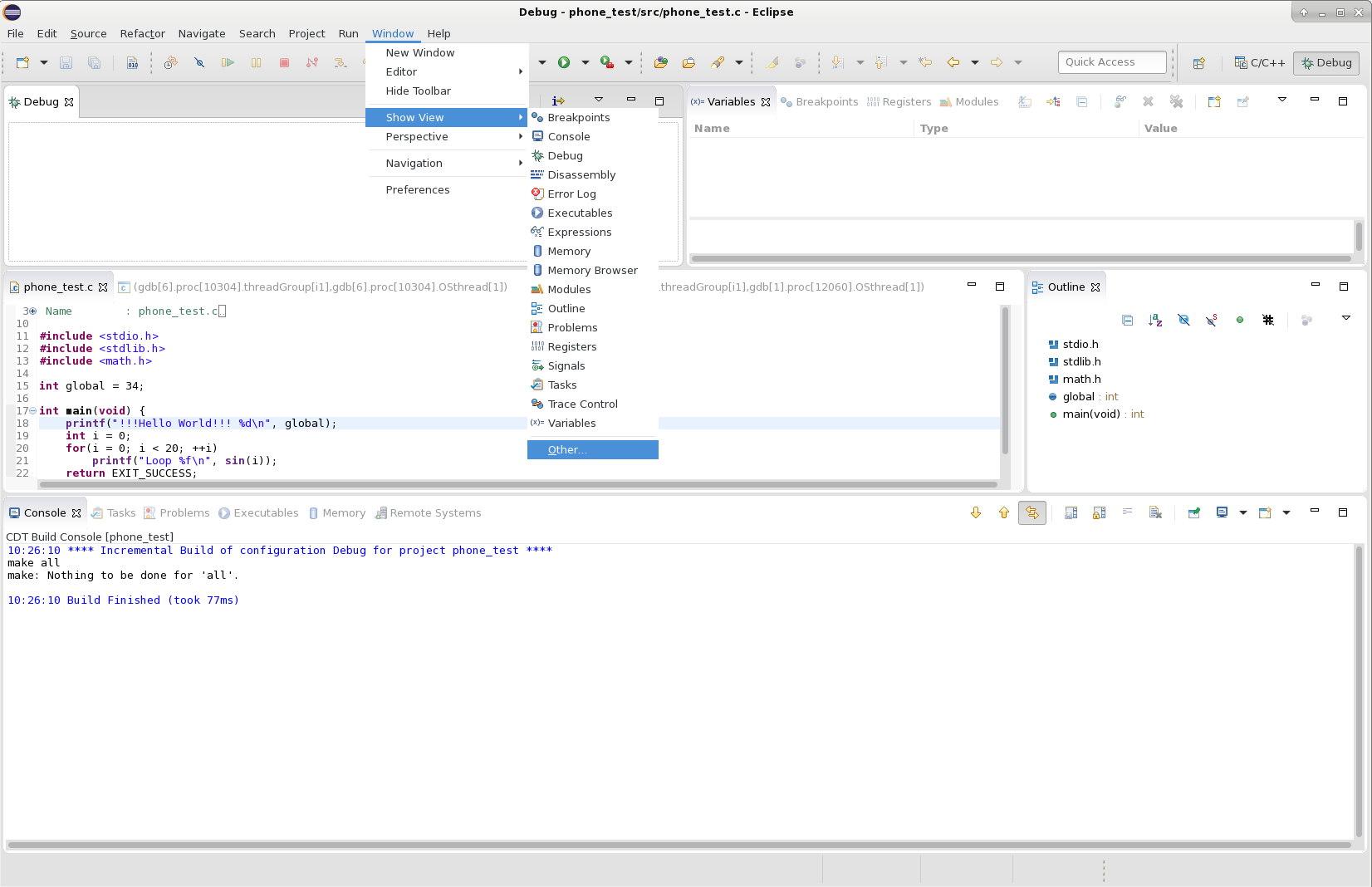
and so type "remote" into the filter box and select Remote Systems.
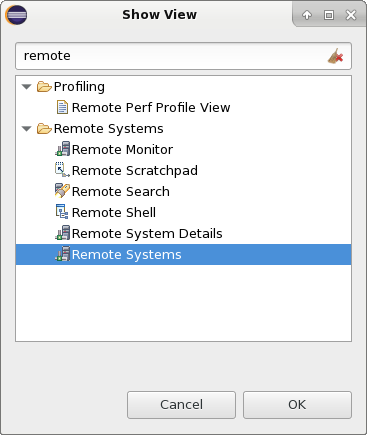
Choose the right connection from the connection list and cull Disconnect
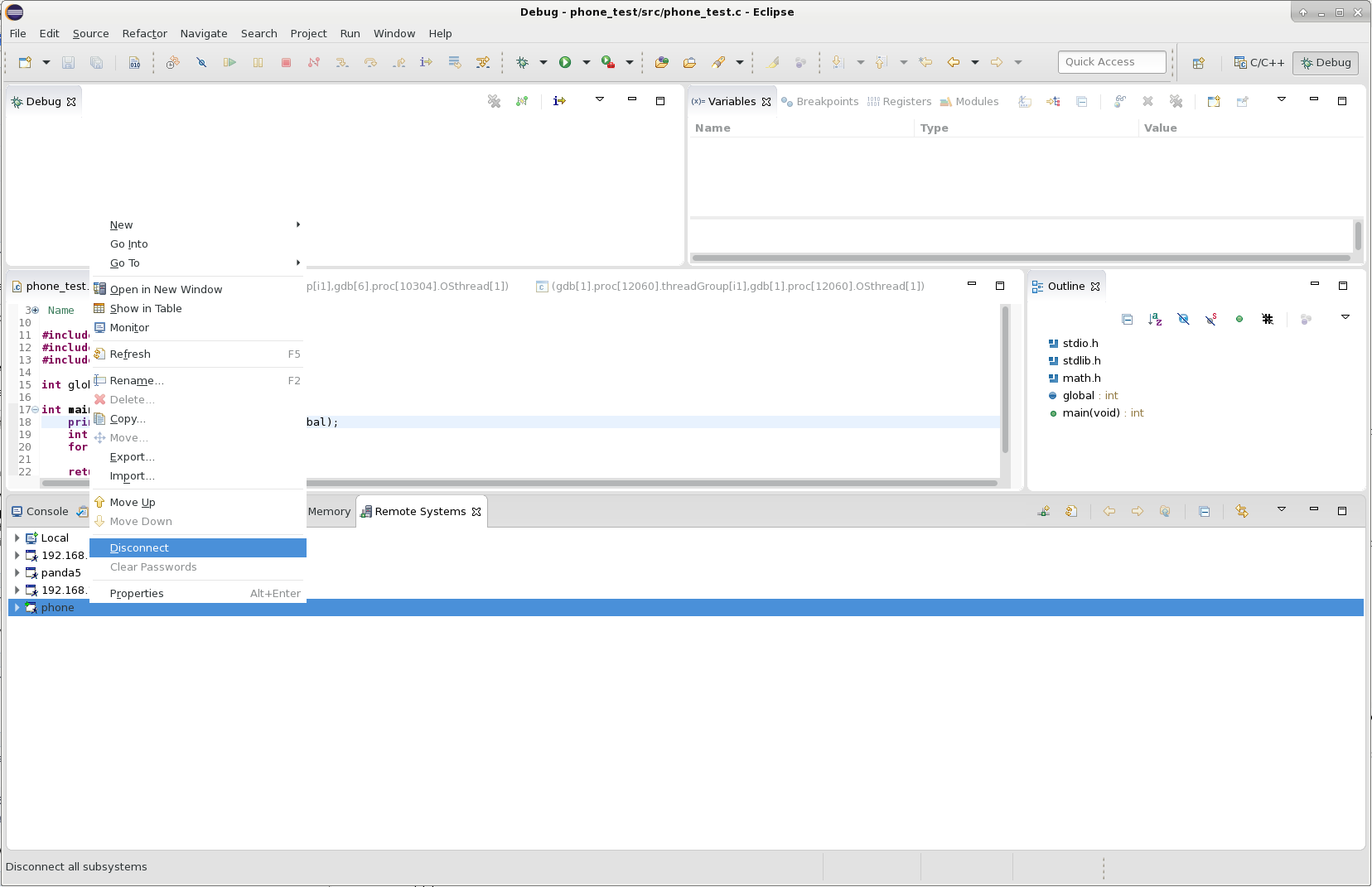
then restart the debug session past clicking the Debug push on the Debug configurations dialog.
The post-obit message:
Session.connect: java.security.InvalidAlgorithmParameterException: Prime number size must be multiple of 64, and can only range from 512 to 1024 (inclusive) means that your Java Virtual Automobile (JVM) is too old. Upgrade to at least 1.viii.0.
If Eclipse says
Could not decide GDB version using command: udb --version It might hateful that you lot have not copied the primal file onto the target.
Source: https://docs.undo.io/Eclipse.html
0 Response to "Eclipse Remote Gdb Error During File Upload Operation Failed. File System Input or Output Error"
Post a Comment